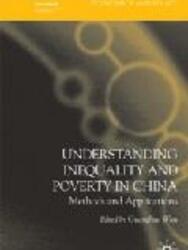Book
Understanding Inequality and Poverty in China
Methods and Applications
The ongoing campaign of 'western development' launched in 1999 and the recent Chinese government initiative of 'building a harmonious society' highlight the urgency and significance of analysing inequality and poverty. Prominent contributors from China and around the world explore trends of inequality and poverty in China, identify their causes and assess their consequences. Issues explored within this volume include regional/personal variation in incomes, measures of human wellbeing – such as health and education – the gap between the coastal regions (which have strongly benefited from the expansion of China's exports) and the interior regions, and urban–rural disparity. This volume also examines the impact that a variety of different factors have had in determining inequality and poverty and their dynamics. Factors examined include resource endowment, location (including proximity to major transport links such as coastal ports), historical differences in the pace of economic development, the uneven impact of economic reform and imbalance in the provision of economic and social infrastructure.
 Join the network
Join the network